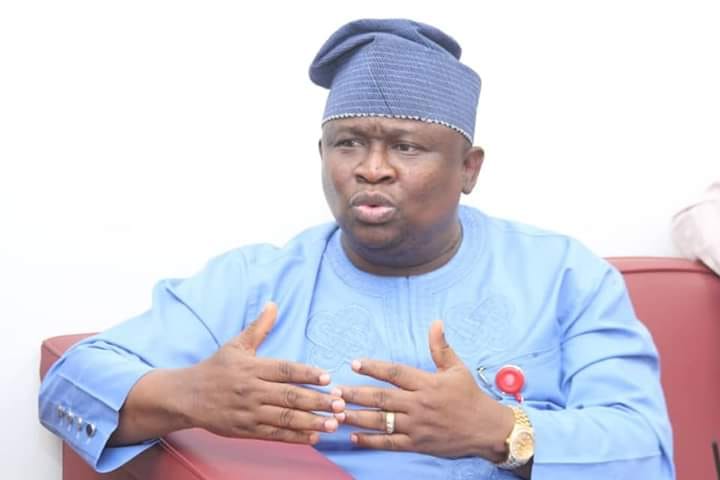Chairman of the Senate Committee on Finance, Senator Solomon Olamilekan Adeola, made earth shattering revelations on Wednesday during consideration of the 2022-2024 Medium Term Expenditure Framework and Fiscal Strategy Paper.
According to the lawmaker, a huge part of Nigeria’s total debt profile roughly estimated at N33trillion naira were incurred by past administrations dating back to the military era.
He disclosed that majority of the loans being repaid presently by the President Muhammadu Buhari administration were ones accumulated from the times of the military to those of the PDP administration under Ex-Presidents Olusegun Obasanjo, Umaru Musa Yar’Adua and Goodluck Jonathan, between 1999 and 2015.
Senator Adeola disclosed this when asked by the President of the Senate, Ahmad Lawan, to make clarifications on concerns raised by lawmakers, particularly over Nigeria’s debt profile during deliberation on the report of the Joint Committees on Finance; Local and Foreign Debts; Banking, Insurance and Other Financial Institutions; Petroleum Resources (Upstream); Downstream Petroleum Sector and Gas on the 2022-2024 Medium Term Framework.
Responding, Adeola said, “The borrowing you are saying is accumulated borrowing. It is not a borrowing of this administration alone, it is a borrowing that stems from the days of the military to the days when the Democratic dispensation started.
“It is an accumulated loan, it is not a loan that says that it is the current administration of President Buhari that has borrowed.
“It is a loan that has been borrowed by the previous administration – the Obasanjo, the Jonathan, the Yar’Adua of this world.
“[And] since the business of government is a continuum, the President of the day has no choice but to continue to pay back all these loans that have been borrowed by the previous administrations.
“More than three-quarter of these loans you’re seeing were borrowed from the previous administrations, and we are paying back – we are doing what is supposed to be done, the way it is supposed to be done.
“So, when my colleague said that for every sixty-seven naira of any loan that was borrowed, we are using to pay, he should know that more than sixty naira of it are loans borrowed by previous administration. And that is where we are.”
The Senate President, Ahmad Lawan, in his concluding remarks blamed Nigeria’s economic predicament on the failure of past governments to prioritize the provision of critical infrastructure.
According to him, the situation has left the present administration with no other viable option but to seek external borrowing to fund capital expenditures in the national budget.
“I believe that we have learnt so much from the clarification which the Chairman of the Joint Committee gave.
“Let me say this, when you don’t make hay while the sun shines, this is the kind of thing you face.
“When we had plenty of money, we didn’t prioritize the construction of infrastructure in Nigeria. We wasted our resources when we had much.
“Today, we realize we need to construct infrastructure because that is the only way to develop the country. Unfortunately, we don’t have the kind of resources we had before.
“Now, our options are very limited because our revenues are limited. I agree with all our colleagues who said we need to reduce borrowing.
“The Committee on Finance particularly has been doing a good job of ensuring that Ministries, Departments and Agencies (MDAs), particularly Government Owned Enterprises (GOEs), contribute more to the national coffers than they normally do.
“[And] that is why we have more resources today, more revenues or funds in the Independent Revenue Contribution.
“Our Committees need to do a lot of oversight, because when we don’t do the oversight, we also come here annually to this kind of thing of non-remittance of funds.
“Committees are supposed to know how much a Ministry or Agency of Government receives and contributes or remit to the treasury. We actually need to up our game in the area of oversight.”
Baring his thoughts on the raging controversy of Value Added Tax remittance to the Federal Government, the Senate President said, “I think there’s nothing wrong in continuing with VAT as part of our revenues, because there’s no finality in any judgement yet and, therefore, we shouldn’t confuse our system.
“Until there’s such a very clear cut definite judgement by the Supreme Court, we should go ahead with VAT as part of the resources available to us.
“I want to also challenge the Federal Inland Revenue Service, the Customs and other major revenue collecting or generating agencies, that they need to sit up.
“They need to bring in more revenues because we have given them all the support that is necessary. The Federal Inland Revenue has received a lot of support from this National Assembly, particularly the Senate, and they have no reason not to improve on their collection.”
Speaking on remittance of generated revenues by Agencies of Government, Lawan charged the relevant Senate Committees to identify MDAs with sufficient revenue earnings to fund their operations.
He explained that doing so would create grounds for the exclusion of such MDAs from the national budget, as well as cut down on government’s annual expenditure.
“Other agencies of government get IGRs and they don’t remit. In fact, they wait for us to give them allocations or appropriations.
“I think it is high time our Committee on Finance or any other related Committees to look at those agencies that we should stop funding through the annual budget, because what they collect is more than enough for them to operate, and in fact they should actually contribute to the national treasury”, the Senate President said.



